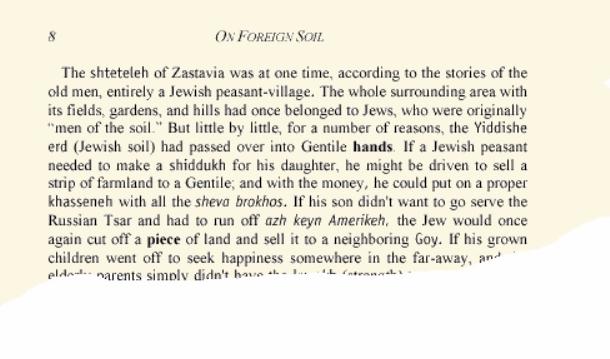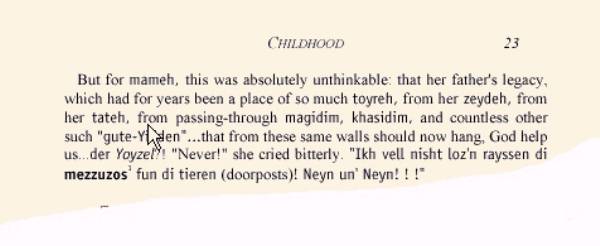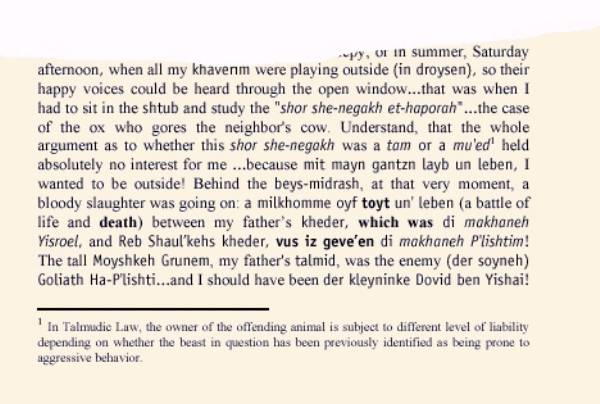
It's more fun in Yiddish!
This book teaches you to read Yiddish as it goes along. Starting off with only the occasional word, it gradually introduces phrases, grammatical constructions, and whole sentences, until the very last chapter is 100% Yiddish. We've posted 23 exerpts from the book, including MP3 VOICE CLIPS so you can hear what the Yiddish sounds like!
In the first few chapters, isolated Yiddish words are introduced, with explanations where the meaning cannot be easily seen from context. In the first chapter, for example, Zolf explains how the Jews had come to lose possession over the agricultural lands they had once owned: (Click on the story-teller icon for the voice clip!)

Words that are introduced for the first time are translated in parentheses, unless their meaning can be easily guessed by the reader...for example, in this passage, the reader is supposed to figure out that a khasseneh is a wedding. When a word or phrase appears in quotations or italics, it sometimes means that the reader is not expected to guess the exact meaning, but merely to get the general drift. In this example, the reader should understand that a khasseneh with all the "sheva brokhos" is, in some sense, a "proper wedding"; and his understanding of the passage as a whole does not depend on any specific knowledge of the "seven blessings" involved in a traditional Jewish wedding.
Dialogue is especially colorful when given in its original Yiddish. In chapter four, Zolf’s mother has inherited her parents house. Unfortunately, she is not permitted to move there with her family, because Jews had recently been expelled from the larger towns. Her husband, Zolf’s father, suggests that she sell the house "tzu a Goy" and be done with it....

In this passage, the reader is to understand that her father’s former home had been a frequent meeting-place for religious Jews; that "der Yoyzel" is a not-too-complimentary reference to the icons hanging on the walls of the typical Gentile home; and that Zolf’s mother adamantly refuses "to let the mezzuzahs be torn from (her father’s) doorposts", that is, to let her home be occupied by Christians.
Young Zolf’s education was always a bone of contention between his mother and father. Although the elder Zolf conducted a class, or "kheder" in his living room, his son Falk was considered to young to study together with his regular students. So he tried to cram what learning he could into his off-hours and spare time. From Chapter Eight:

Here we get some idea how much Hebrew was invovled in the study of Talmud. Remember that young Zolf was only ten years old in this incident, yet he is already expected to learn abstruse legal concepts and principles! Note also the use of parallel grammatical constructions to hint at the meaning Yiddish phrases, as exemplified by the passage: "...which was (the camp of Israel)......vus iz geve'en (the camp of the Phillistines)...".The reader who is sensitive to such techniques will find the Yiddish much easier to decipher.
For more examples of how Yiddish helps bring the story to life, click on the links below. They are listed in the order in which they appear in the book, so the later excerpts have more and more Yiddish content:
Getting ready for the tax-collector
The Town Council in Zolf’s village had a Jewish representative, who took it upon himself to warn Zolf’s father when a tax collector was about to make an unscheduled visit. In those days, a father was subject to a three-hundred rouble fine if his son failed to report for military service. Zolf had two older brothers who had already fled to America, so his family lived in deathly fear of the tax collector. Fortunately, in those days, one could not tax what one could not find. In Chapter Seven, Zolf describes how they would get an "inside tip" that trouble was on its way.... VOICE CLIP
A creepy rich man who lived in our town
As a boy, Zolf was employed as a yard-hand by a wealthy Jew, an overweight recluse who in addition to being a great miser, was also a great hypochondriac. He had a collection of medical textbooks, and kept all kinds of medical preparations in jars and bottles scattered everywhere throughout his house. In Chapter Eight, the author describes how Reb Shaul Nakhum appeared to him as a young boy: VOICE CLIP
When the author was eleven years old, his mother approached his father with the suggestion that young Zolf be sent off to the yeshiva (Rabbinical college) in Brest. The city of Brisk, as the Jews called it, was a great center of traditional learning; however, it was also the location of a secular high school, or Gymnazia, which was notorious among the Jews for spawning freethinkers and socialists. These agents of Satan had already, a few years previously, led astray one of Zolf’s older brothers. From Chapter Thirteen of "On Foreign Soil": VOICE CLIP
In Chapter Fifteen, we find the eleven-year old Zolf alone in the strange city of Brisk, suffering constantly from homesickness. The endless hours of Talmudic study, with its intricate laws and statutes, only make his longing more intense. His only escape from the drudgery of learning was through his fantasy world. Here he could conjure up scenes and memories from home, which were often mixed together with themes from the Talmud: VOICE CLIP
The homesickness that tormented young Zolf when he was first sent away to study in the Brisk Yeshiva eventually began to fade, as he found new diversions in his home away from home. Saturday afternoon was the high point of his week...it was then that he would go to listen to the travelling preachers, who used to peddle their own particular versions of salvation from town to town. In the following passage, the synagogue is packed to overflowing; the listeners sit transfixed as the renowned preacher Reb Elikum Getzel delivers a performance. A motif which recurs elsewhere in the book is the image of the "shiny gold buttons". A young person wearing the uniform of a secular high school student was something abhorrent to the traditional elders, because, as we see here, the road to damnation begins with the adoption of the Gentile manner of dress; progresses to the smoking cigarettes on the Sabbath, the eating of non-Kosher food, and leads ultimately to the Fires of Hell. From Chapter Eighteen: VOICE CLIP
A parable about Joseph in Egypt
The City of Brisk attracted every kind of travelling preacher and story-teller (see "A Fire-and-Brimstone Preacher"). Here the author recalls the feeling of being transported on words back to ancient Egypt, where the Patriarch Jacob lies on his death-bed in the presence of his twelve sons. Joseph, the youngest, the King’s Minister, has just brought forward his two sons Menasseh and Ephraim to receive their grandfather’s blessing.
In this remarkable parable, the great issues confronting the Jews of the Russian Pale are re-cast in biblical terms. Jacob represents the old traditions, and Menasseh and Ephraim represent the young people who wear modern clothes and attend the Russian schools. Note how images of Egypt are mixed with those of Old Russia...the style of dress, the way the story-teller translates the Hebrew dialogue into Yiddish for his listeners, and most of all, the image of the furious patriarch, outraged that his grandchildren should dare to appear before him in such "goyish" dress. Let us now join the enthralled congregation as the evening shadows are already beginning to appear on the walls of the tiny "Tailor’s Synagogue". From Chapter Eighteen: VOICE CLIP
Falk’s studies are progressing well. Home for the holidays, his father gives him a little quiz on the Talmud, and discovers to his joy that his son is well on his way to becoming a fine scholar. Falk’s mother, hardly able to believe her good fortune, insists that they get a second opiniont; so they take him to town to see the Rabbi of Kamenetz. The result is the same...to every question, Falk has a ready answer. The rabbi takes the elder Zolf aside, and assures him that, God willing, he will have plenty of "nakhis" from his clever son. For his mother’s reaction to this wonderful news, read the following excerpt from Chapter Twenty: VOICE CLIP
In Brisk, Falk has comfortably settled into the life of a yeshiva-bukher, when suddenly one day, out of the blue, he receives a letter from his brother the apikoyris (freethinker) who lives in Warsaw. Aryeh-Leyb begins by telling Falk that the word consists of more than just old Jews with beards and peyos; that there is a better, richer world there for the taking; but that to get one’s share of that world, one must be armed with knowledge, with education. He is therefore sending his younger brother a little "parcel" care of a good friend of his. After cautioning Falk not to let his parents know what he is doing, Aryeh-Leyb finishes the letter by urging him to hurry, because soon the day will come when they will have to "resucue" their parents and younger siblings from the dark shtetl. From Chapter Twenty-One, here is the letter throws Falk into a state of turmoil and confusion, and ultimately changes the course of his future life: VOICE CLIP
Full of apprehension, Falk has gone to the home of his brother’s friend, to pick up the parcel that Aryeh-Leyb sent him "all the way from Warsaw". To his astonishment, he finds that he has stumbled into a secret evening class, set up by idealistic young people to spread progressive thought among the poor, ignorant yeshiva-bokhers of Brisk! The teacher is a young girl from the local Gymnazia, a seventeen-year-old beauty with sparkling eyes and cherry-red lips. As the other "students" settle in to their lesson, Falk finds himself invited to join in. Powerless to resist, he knows that he is taking a monumental step from which there is no turning back. From Chapter Twenty-One: VOICE CLIP
While at school in the big city, the young Zolf fell under the influence of socialists and free-thinkers, friends of his older brother, Aryeh-Leyb, who introduced him to illicit reading material. When he returns home for Passover, it is immediately clear to him that his parents have found out. The tension in the house builds steadily, until on the Eve of Passover, it is unbearable. The moment the family’s Passover service is over, all hell breaks loose. From Chapter Twenty-Four: VOICE CLIP
After nearly being led astray by the freethinkers of Brisk, the fourteen-year-old Zolf was sent away by his parents to the much more distant and much stricter Yeshiva in Slobodka. The Town of Slobodka was a poor, sleepy Lithuanian village that happened to be the home of four great Yeshivas. But unfortunately, all the temptations of the modern world were to be found just across the bridge that led to the cosmopolitan city of Kovno. From Chapter Twenty-Seven: VOICE CLIP
The outbreak of war was a terrifying event in the Slobodka Yeshiva, especially for those foreign-born students who now found themselves stranded in enemy territory, with no way to return home. The advice of the Rabbis, to trust in God, was little consolation to the young students as they frantically rushed to leave town before it was occupied by the rapidly-advancing German Army. From Chapter Twenty-Nine: VOICE CLIP
Young Falk has taken refuge in the Town of Molodetchno when news arrives that the Czar has ordered the deportation of all Jews from the Lithuanian front. The Jewish townsfolk witness the first convoys of railroad cars packed with deportees. They rush to the train station to bring food and water to the starving Jews, but are forced back at the train station by armed guards! Apparently, the local authorities have ordered that no food is to be allowed to these "enemies of the Fatherland".
After an late-night meeting in the town synagogue, the elders decide to risk bribing the government officials, so that they might relax the strict quarantine which had been imposed against the unfortunate Jewish deportees. Late at night, a small delegation makes its way to the home of the chief of police. From Chapter Thirty-Three: VOICE CLIP
The years of pogroms had all but drained the Jewish community of any feelings of patriotism they might have had towards the Russia of the Czars. Anti-Jewish sentiment ran even higher after the outbreak of war, with Jews being accused of treason and sabotage, including an uncle of Zolf, a contractor in the Grodno district who was sentenced to death and hung based on a slanderous accusation. The civilian Jewish population had already been subjected to looting, pillaging, and deportation. These events made Falk all the more determined to avoid being conscripted into the army. From Chapter Thirty-Four: VOICE CLIP
Falk’s uncle has just returned from a three-day trip to the Village of Budeslav, where he has purchased a false passport for his nephew, to delay for one more year they time when Falk will have to report for duty. Taking great precautions so that no one should see, he carefully cuts open his breast pocket, and extracts the illegal documents, which had once belonged to a young man who was now far away, in the Golden Land of America. And equally important, he gives Falk a second piece of paper containing the names of his new family, which he must memorize to the last detail ("oyf oysen-veynik") in case he is ever interrogated by the police. From Chapter Thirty-Four: VOICE CLIP
One of the remarkable things we learn about life in Old Russia was the fact that despite all the persecutions, there was still a sense of fair play and respect for human dignity. A case in point is the treatment of the refugees ("bezhentzes") fleeing the front. As caravans of homeless, most of the Jews, began to converge on the village of Rakov, the Russian Red Cross was there to make sure that they were provided with the necessities of life. Things didn’t always go smoothly, but here we see how the Christian Red Cross and the local Jewish commitee were able to amicably resolve the problem of providing kosher meat to the Jewish homeless. From Chapter Thirty-Seven: VOICE CLIP
Falk spent much of the winter of 1916 secluded in his rented room in the village of Rakov, where he discovered a love of writing. His mysterious activities aroused the curiosity of the young women of the village, who took to visiting his landlord’s daughter, hoping for a glimpse behind his locked door. Falk remained oblivious to their interest in him until one day, one of them worked up the courage to open his door and creep up behind his chair. "Excuse me," she asked blushingly, "but I was wondering if you might show me what you are writing.....". From Chapter Forty-Two: VOICE CLIP
At the start of 1917, Falk is working in a Jewish-owned leather factory deep in the heart of Russia. He is still travelling under a phony name, "Taytsh". This comical-sounding name was a source of considerable mirth among Falks’s co-workers when he was first introduced to them; and a couple of months later, the mirth was re-kindled when another young man showed up at the factory with the same name! Falk soon figured out that the newcomer must have purchased his false identity from the same Lithuanian dealer from whom Falk’s uncles had acquired his own papers. Gradually things settled back to normal, until one day the supervisor ("starshiy") showed up on the factory floor, clutching his sides in convulsions of laughter. Close behind him there followed a tall, dignified-looking Jew with a puzzled expression on his face. From Chapter Fifty-Three: VOICE CLIP
* * * RETURN TO HOME PAGE * * *YIDDISH EXCERPTS * * *
* * * ORDER THE BOOK * * * SEND US A LETTER * * *
* * * ABOUT THE TRANSLATOR * * *